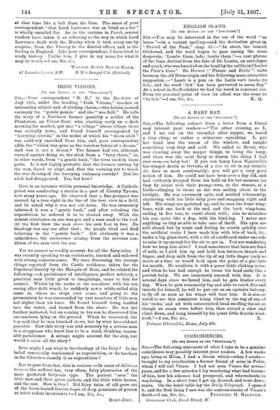IRISH VISIONS.
rro THE EDITOR OF THE " SPECTATOR:] SHI,—Your correspondent "D. S.," in the Spectator of July 24th, under the heading "Irish Visions," touches an interesting subject and of abiding charm,—the fairies, termed variously the "gentle people" and the "wee folk." He tells the story of a Northern farmer (possibly a settler of the Plantation, an Ulster Scot) who, starting early on a dark morning for market, got into "a village" where village there was actually none, and found himself accompanied by "hurrying crowds," in the midst of which his "thorn stick" was suddenly snatched from him, and, your correspondent adds, the "vision was gone as the baseless fabric of a dream." And was it not a dream ? The farmer had cut, although warned against doing so, the stick from a "fairy thorn," or, in other words, from "a gentle bush," the term used in these parts. Is it not highly probable that the farmer, resting by the way, dozed or slept, and that the warning not to touch the tree developed the hurrying visionary crowds But the stick had disappeared. Yes, but how ?
Here is an instance within personal knowledge. A Catholic priest was conducting a station in a part of County Tyrone, now many years ago. He observed that a fine prospect was marred by a tree right in the line of the best view in a field, and he asked why it was not cut down. He was reverently informed it was a "gentle bush," and after rebuking the superstition he ordered it to be cleared away. With the utmost reluctance an axe was got, and a man used to the tool. At the first blow the man clove his own foot in two. No theology was any use after that ; the people lived and died believing in the "gentle bush." But obviously it was a coincidence, the occurrence arising from the nervous con- dition of the man with the axe.
Yet we cannot so readily account for all the fairy-tales. I was recently speaking to an ecclesiastic, learned and endowed with strong common-sense. We were discussing the strange things reported from the Castle residence, taken for the Psychical Society by the Marquis of Bute, and he related the following :—A parishioner of intelligence, perfect sobriety, a practical man little given to imaginings, came to him for counsel. Whilst by the rocks at the sea-shore with his son seeing after drift wrack, he suddenly saw a white-sailed ship come in, where no ships ever come, and going to the promontory he was surrounded by vast numbers of little men not higher than his knee. He found himself being hustled into the water, and turned from the shore. He was not farther molested, but on coming to his son he discovered him unconscious, lying on the ground. When he recovered, the boy said that he was knocked down, but by what he could not perceive. Now this story was told seriously by a serious man to a clergyman who knew him to be a staid, thinking, reason- able parishioner. A mirage might account for the ship, but would it cover all the story ?
Here might I ask what is the theology of the fairy ? Is the belief canonically condemned as superstition, or do teachers in the Churches classify it as superstition ?
But to pass from that, this is curious :—In cases of delirium tremens the sufferer has, very often, fairy phantasies of the most perfected fairy-tale type. The patient "sees" the little men and their green jackets, and the little white horses, and the rest. How is this ? Did fairy tales of old grow out of the brain-heated fancies begot of deep potations of poteen or other ardent intoxicants ?—I am, Sir, &ca BORY-DELI.






































 Previous page
Previous page